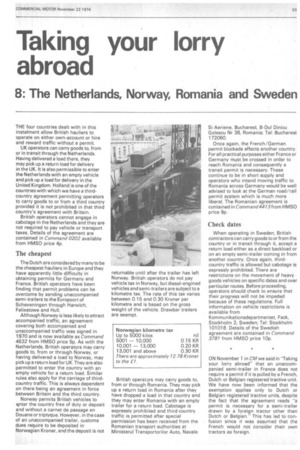Taking your lorry abroad
Page 55

If you've noticed an error in this article please click here to report it so we can fix it.
8: The Netherlands, Norway, Romania and Sweden
THE four countries dealt with in this instalment allow British hauliers to operate on either own-account or hire and reward traffic without a permit.
UK operators can carry goods to, from or in transit through the Netherlands. Having delivered a load there, they may pick up a return load for delivery in the UK. It is also permissible to enter the Netherlands with an empty vehicle and pick up a load for delivery in the United Kingdom. Holland is one of the countries with which we have a thirdcountry agreement permitting operators to carry goods to or from a third country provided it is not prohibited in that third country's agreement with Britain.
British operators cannot engage in cabotage in the Netherlands and they are not required to pay vehicle or transport taxes. Details of the agreement are contained in Command 0202 available from HMSO price 4p.
The cheapest
The Dutch are considered by many to be the cheapest hauliers in Europe and they have apparently little difficulty in obtaining permits for Germany and France. British operators have been finding that permit problems can be overcome by sending unaccompanied semi-trailers to the Europoort of Scheveningen through Harwich, Felixstowe and Hull.
Although Norway is less likely to attract accompanied traffic, an agreement covering both accompanied and unaccompanied traffic was signed in 1970 and is now available as Command 4632 from HMSO price 5p. As with the Netherlands, British operators may carry goods to, from or through Norway, or having delivered a load to Norway, may pick up a return load for UK. They are also permitted to enter the country with an empty vehicle for a return load. Similar rules also apply for the carriage of thirdcountry traffic. This is always dependent on there being an agreement in force between Britain and the third country.
Norway permits British vehicles to enter the country free of duty or deposit and without a carnet de passage en Douane or triptyque. However, in the case of an unaccompanied trailer, customs dues require to be deposited in Norwegian Kroner, and the deposit is not returnable until after the trailer has left Norway. British operators do not pay vehicle tax in Norway, but diesel-engined vehicles and semi-trailers are subject to a kilometre tax. The rate of this tax varies between 0.15 and 0.30 Kroner per kilometre and is based on the gross weight of the vehicle. Drawbar trailers are exempt.
British operators may carry goods to, from or through Romania. They may pick up a return load in Romania after they have dropped a load in that country and they may enter Romania with an empty trailer for a return load. Cabotage is expressly prohibited and third-country traffic is permitted after special permission has been received from the Romanian transport authorities at Ministerul Transportorilor Auto, Navale Si Aeriene, Bucharest, B-Dul Dinicu Golescu Nr 38, Romania: Tel: Bucharest 172060.
Once again, the French/German permit blockade affects another country. For all practical purposes either France or Germany must be crossed in order to reach Romania and consequently a transit permit is necessary. These continue to be in short supply and operators who intend moving traffic to Romania across Germany would be well advised to look at the German road/rail permit system which is much more liberal. The Romanian agreement is contained in Command 4413 from HMSO price 9p.
Check dates
When operating in Sweden, British contractors can carry goods to or from the country or in transit through it, accept a return load either as a direct backload or on an empty semi-trailer coming in from another country. Once again, thirdcountry traffic is allowed but cabotage is expressly prohibited. There are restrictions on the movement of heavy goods vehicles on specific dates and over particular routes. Before proceeding, operators should check to ensure that their progress will not be impeded because of these regulations. Full information on vehicle restrictions is available from Kommunikationsdepartmentet, Fack, Stockholm 2, Sweden; Tel: Stockholm 101018. Details of the Swedish agreement are contained in Command 3787 from HMSO price 10p.
ON November 1 in CAel we said in "Taking your lorry abroadthat an unaccompanied semi-trailer in France does not require a permit if it is pulled by a French, Dutch or Belgian registered tractive unit. We have now been informed that the exemption applies only to Dutch or Belgian registered tractive units, despite the fact that the agreement reads "a permit is necessary for a semi-trailer drawn by a foreign tractor other than Dutch or Belgian.This has led to confusion since it was assumed that the French would not consider their own tractors as foreign.




















































































































